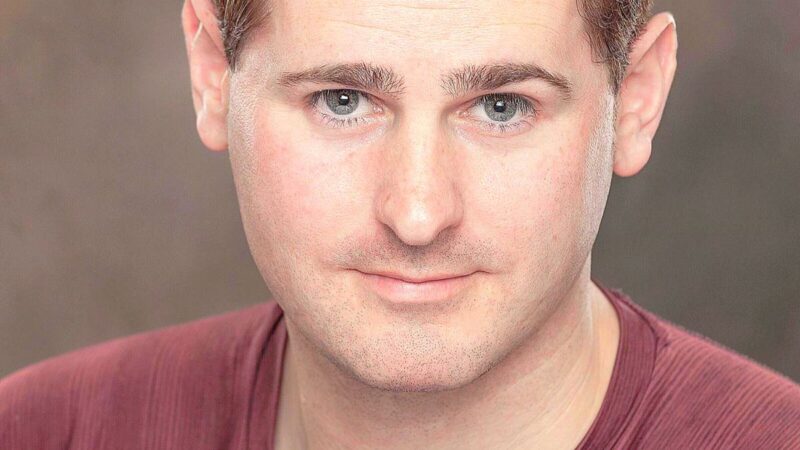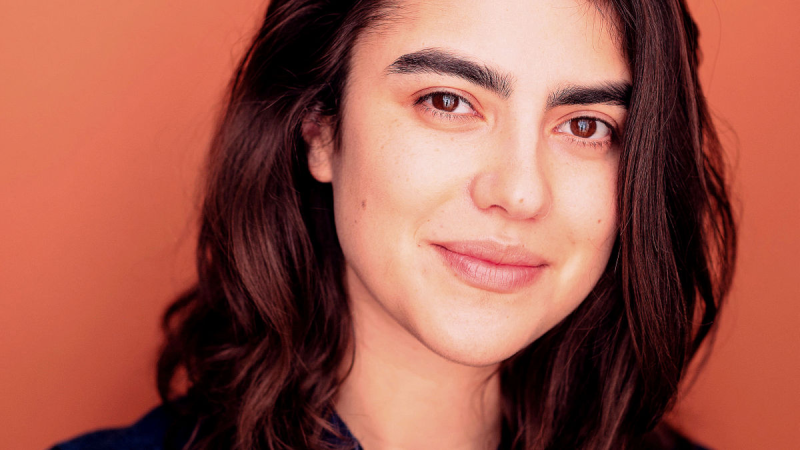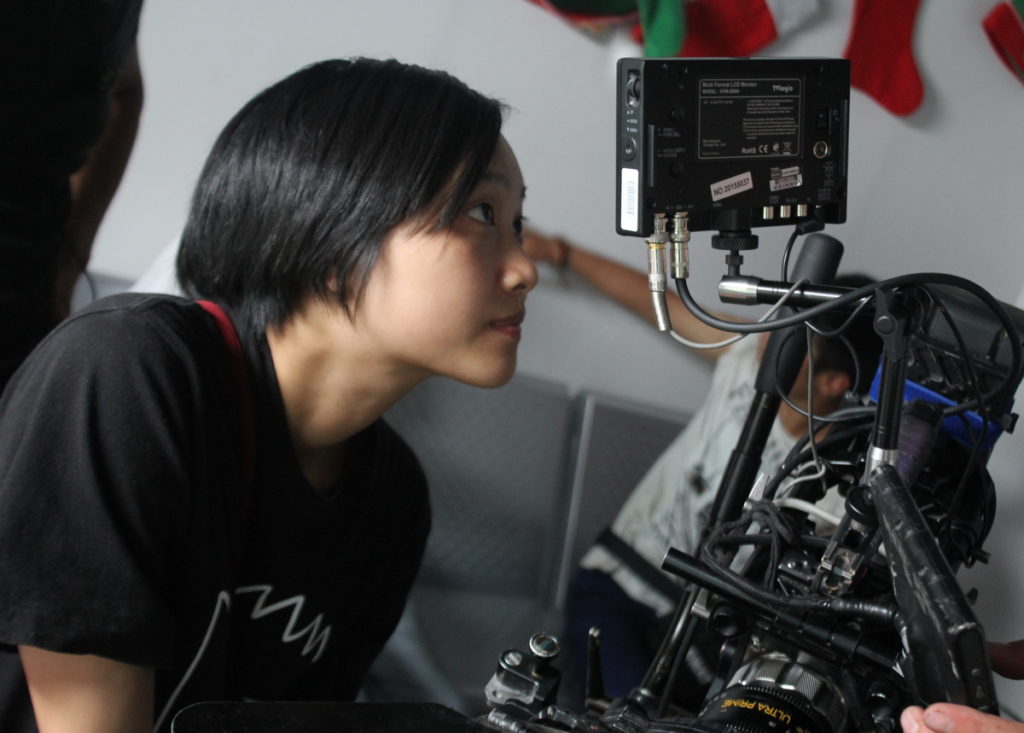
indieactivity: Hello Abigail, it is nice to meet you. Can you introduce yourself? How would you describe your work as a director?
Abigail He: Hi! I’m a NYC based indie filmmaker who was born in China. I’ve been writing and directing short films since 2013. My previous film Before Christmas was selected in over 20 film festivals around the world and has won several awards. My experimental short film FLOW was broadcasted on PBS Channel 13. I’m now working on my new project Other States of Matter (the Key Art is seen below), an experimental film that serves up a dreamlike, nonlinear journey about female puberty, growth, and adulthood through the eyes of a 14-year-old girl.
I think all my films more or less reveal part of me. Each film reflects my aesthetic, value, thought or concern when I made it, even those are based on true stories. Now when I look back, although my aesthetic and style have changed a lot throughout the years, I notice they truly represent who I was at the time. So I think my work speaks for me, both as an artist and as an individual.
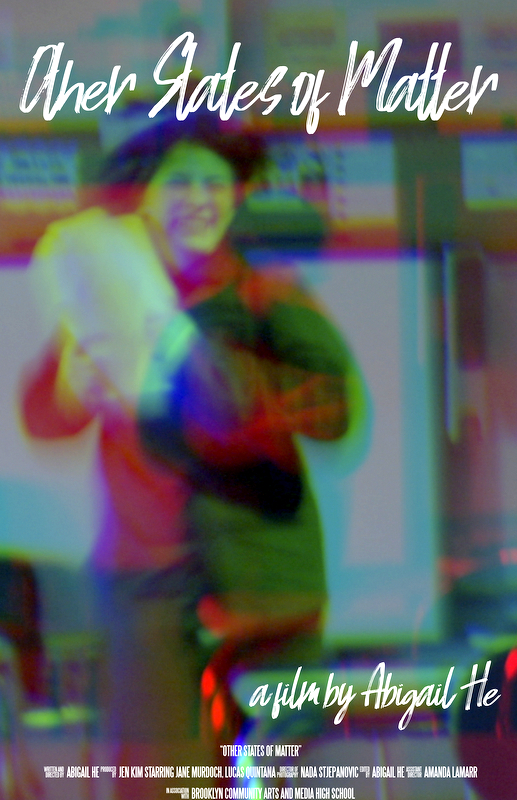
indieactivity: How do you choose a project to direct?
Abigail He: I’m more of a craftsman in filmmaking. So, it’s actually the other way around, it is the projects that come to me. It is this calling inside your heart that you know you have to make it happen, no matter what. There were several times I felt absolutely devastated when I was in pre-production for my films. Like those moments when you know things are not going to happen no matter how hard you try. So I put it aside and decided to give up the project. But it kept haunting me and I couldn’t turn my back on it. I think it really is because my films are from inside, so there is this invisible bonding between me and my work that I can’t ignore or disconnect. I like a quote from a painter when he was asked, “what a real artist is?” He said, “an artist is a mailman who delivers messages!” I think his answer is just brilliant. The process of art-making is expressing and delivering the emotions and energy within yourself, simple as that. All you need to do is listen to your heart and be true to yourself.
indieactivity: So you are the writer and director of all your films? Do you find it difficult to manage both positions?
Abigail He: Yes. I’m the writer and director of all my projects. Because my scripts are from within myself, I believe I’m the best person to bring the scripts to life and transform them into films as nobody knows myself better than I do. I remember an actor friend of mine once asked me if I would be interested in directing a script he wrote and I ended up encouraging him to direct it himself. Not because I don’t like his script, but I believe he was the best person to direct the script he wrote. Making a film is very similar to giving birth to your child, it’s from you, your body and soul. Because of that, being a writer and director of my films is very natural in the creative process.
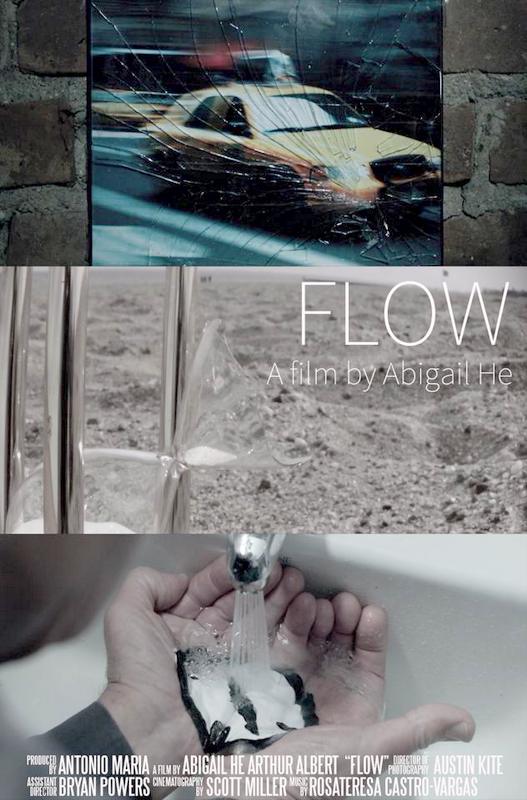
indieactivity: As an indie filmmaker, do you consider yourself part of the film industry?
Abigail He: “I think I always am and always will be an outsider of the so-called film industry“. It never occurred to me that I wanna be a member of the club. First of all, ‘industry‘ is a troubling word for any type of art making. It means mass production, standardization and putting things in boxes. It’s about quantity, profit and money. It completely goes against the purpose of art making. I think it’s very unfortunate when an artist has to give in to be accepted in the so-called ‘industry‘. There are thousands of films on Netflix that look almost exactly the same and thousands more to come. That’s what mass production is. It’s extremely problematic because the ‘industry‘ is killing craftsmanship.
Having said that, I support filmmakers who are in the ‘film industry‘ to fight for their own creativity and originality. If they can find the perfect balance between their aesthetics and the system, their work can bring a tremendous impact on how people value cinema and art.
indieactivity: And how do you find the balance between your art and the system?
Abigail He: I’m not sure art making intends to find that balance. It’s like you shouldn’t think of the mountaintop when you are still climbing the mountain. You might find the perfect balance when your work carries your soul.
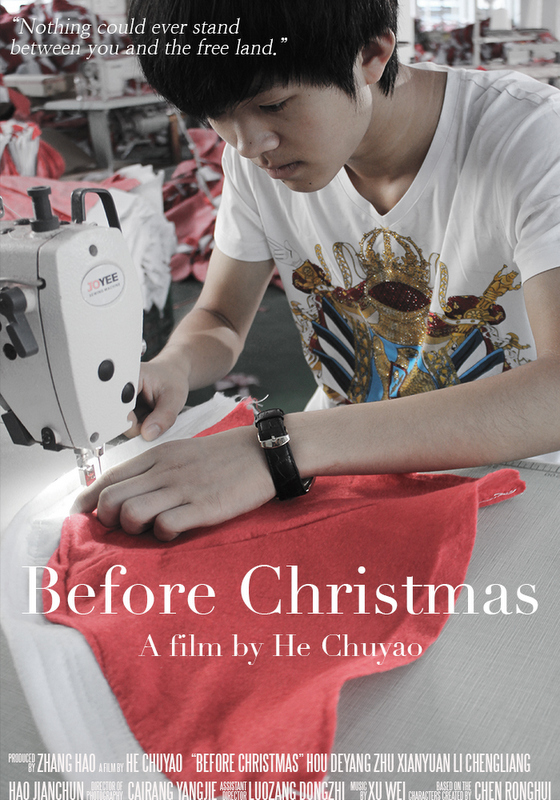
As I mentioned earlier, my aesthetic and style have changed a lot over the years. I started with a very traditional, straightforward storytelling style. My first short film is a social criticism piece and most of my early work is either based on true stories or real live characters. So I was more into realism, to recreate and reflect upon reality. Very much as a standard oil painting portrait, completely straightforward. But then I slowly moved away from tractional narrative and headed toward the abstract and experimental style in the past two years. And it truly liberated myself, as an artist, in terms of art making and looking at art. However, compared to the traditional narrative, it has fewer audiences because it’s unconventional and irrational, also it’s not about the content but the form. It challenges the public perception of cinema as a visual and aural medium. But I don’t think you should think about how the audience will respond to your work when you are making it. Stay focus on your art and let your work speak for you. The balance is from inside. If your work has your soul, it will stand out on its own and you will find that balance.
indieactivity: So compared to your early work, is there any difference in your current creative process?
Abigail He: Yes, I’m way more liberated and willing to be led by my intuition now. Because my early films were to recreate reality, my mind was very restricted, rational and logical. When I was working on the scripts, I spent most time to rationalize the characters and overanalyze the story setting and plot details. So the story structures are similar and the scripts are very detailed orientated. But I didn’t realize that had become my creative comfort zone. As I’m moving towards the abstract and experimental direction, I tried very hard to finally liberate myself from the old mindset and step out of the comfort zone. It took me a long time to do that because I needed to channel my mind to let the institution spark and to follow the flow. Intuition is the enemy of our rational mind because it leads you to places that you are not familiar with nor can comprehend. So you don’t feel secure and can’t find your standpoint. Most people can’t stand it and decide to return to their creative comfort zone. But the best thing to do is to conquer your own fear and let your intuition lead you to the other side. It’s not just a creative process, nut almost like a spiritual process.
Also, now I spend a lot of time researching other art mediums; painting, sculpture, mixed media, installation, poetry etc. And other fields like psychology, philosophy, anthropology, linguistic. Because my work is becoming more and more inclusive and condensed, not only about cinema itself.
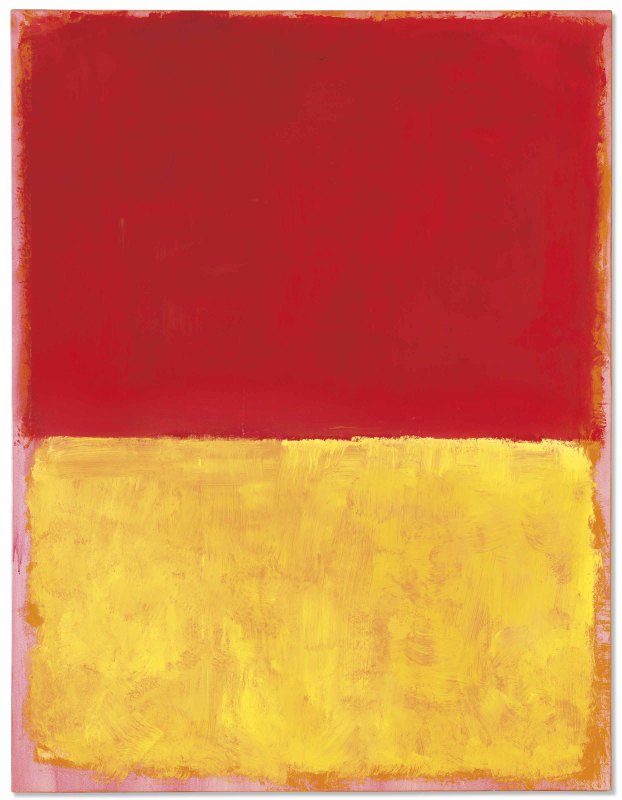
indieactivity: Since your style is now towards abstract and experimental, do you find it more difficult to collaborate during the creative process?
Abigail He: Compare to my early work, yes. I was very frustrated at the beginning when I reached out to people for feedback on my script and concept. People had no clue what they were reading and they were just baffled. It took me a while to realize I need to find my niche audience. So yes, it’s more challenging in a sense but it actually opens up another door, as long as you can find the key to that door.
As for collaboration, it’s very much the same as finding the niche audience. You shouldn’t expect all filmmakers will be interested in this kind of style as you do. It’s totally understandable because everyone has his aesthetic. You need to be more patient to find the right people who share the same aesthetic value with you, who care about the project as you do. It will take a longer time to finally get there but it’s worthy.
indieactivity: What uniqueness do female directors/filmmakers bring to cinema?
Abigail He: Having more female filmmakers in the filmmaking community is a way to encourage filmmakers to fight for their own creativity and originality. It’s the diversity and inclusiveness that keep art alive. Female filmmakers share different values, aesthetics and mindsets with male filmmakers, which is the main reason why their films have different voices. The same as having more filmmakers with various cultural and social backgrounds and ethnicities in the ‘industry’ to foster and embrace the variety in cinema. I’m happy to see it coming, but still, there are a lot more needs to be done.
indieactivity: Can you tell us about your current project?
Abigail He: I’m working on several projects right now. As I mentioned earlier, my latest short film Other States of Matter is 25 minute experimental film that serves up a dreamlike, nonlinear journey about female puberty, growth, and adulthood through the eyes of a 14-year-old girl. Based on a dream and influenced by psychology, surrealism, and expressionism, the film explores the essence of the female psyche. We just finished the sizzle reel post production last month and now seeking grants for our upcoming production in late fall this year. It’s a very exciting project as it combines with analog handmade techniques, painting, sculpture and other elements to reveal the female unconscious mind. It’s gonna be visually and audibly abstract and expressive. I’d been working on it for 2 years so it’s time to bring it to life.
I’m also working on two small video projects at the moment. They are experimental structuralist piece. I never worked with found footage before so the creating process was very exciting. Also, it’s beyond the content and focuses on the form itself, which is a new dimension in creation. But I’m still exploring this new territory and learning from some great avant-garde filmmakers.
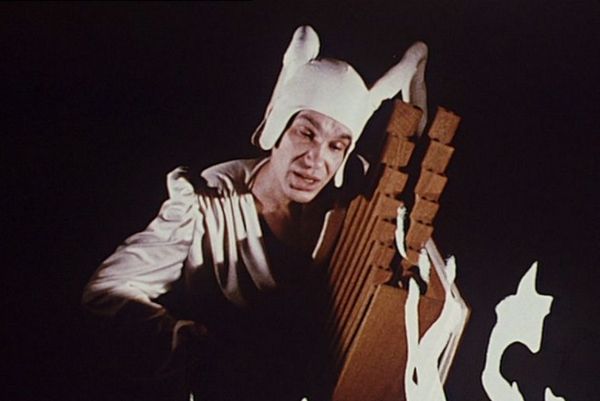
indieactivity: Can you share with us your early films, the ones are more reality-based?
Abigail He: Sure, my previous film Before Christmas is 15 minute narrative short film about a Chinese working-class family relocates to a big city, hoping to live a better life but ends up being another victim of capitalism. It’s inspirited by a photo essay by a Chinese photojournalist about factory workers in the holiday decoration industry. It sheds light on social inequality and child labor issues, which resonates with my very first film when I was still a college student as they are both social criticism piece and reality-based. Right after I finished the production of Before Christmas, I shot a short documentary From Sun to Mao in China. It’s about the annual cult worshipping practice of Mao in his hometown. It also tackles social issues. So you can tell I was deeply influenced by realism at the time.
But before I made Before Christmas, I also did a surrealist short film FLOW about an elderly man suddenly becomes painfully aware of the inexorable passing of time. So now when I look back to my early work, most of the time was the project came to me, instead of me seeking them. Although I moved away from realism, I’m still very proud of all my films. They are like my children, really represent who I was, both as an artist and a human being at the time.
indieactivity: What do you hope audiences will get from the presentation of your films?
Abigail He: I think when I was making my early films, I hoped they can carry messages. Because they are based on reality, I hoped they can tackle social issues, and to raise public awareness on those issues. That was my goal back then. And as my films were screening in different film festivals around the world, I was very grateful to see audiences from different cultural backgrounds relate to the films and the characters I created. I think that’s the biggest accomplishment.
As for my new films, I hope they can offer viewers a new perspective on cinema as a medium and to push the bounties and explore the possibility of image and sound. It’s more about the viewing experience than understanding the content. Hopefully, it will be an organic viewing experience as the viewers can interact with the work itself.
indieactivity: What are your future goals?
Abigail He: My goal is very simple, to continue making art, making films. It has been my only goal since I decided to become a filmmaker. I’ve been thinking a lot about my future self lately. When I get to my 60s and look back to my career, I hope my future self will be proud of what I’m doing. I hope there will be a cohesive body of work in my career. When I first started as a filmmaker, I was very exclusive and narrow-minded. And the film I did back then reflects who I was and how I observed the world. As time goes by, I went through many obstacles and made a lot of mistakes. I was wounded inside but I’m very grateful to the pain. I realized life is a learning process, so is my career. So I started to slow myself down and listen to my heart, instead of looking up and dreaming of changing the world. That was when I began to change my perspective on art and cinema, open up to uncertainty and step out of my creative comfort zone. You can only excel yourself through the process of creating art as it requires self-reflection and self-examination. So yeah, my only goal is to stay focus and continue making art.
indieactivity: You talked a lot about art, do you consider art and film go hand in hand? How do you see yourself in art?
Abigail He: For me, they are in one. Cinema is just a medium. An artist shouldn’t be limited his/her art practice in medium itself. Instead, he/she should focus on the fundamental driving force of his/her art making. Cinema, painting, sculpture, dance, photography, these are just tools to make art. The purpose of art is to liberate and express yourself, that’s what makes everything starts. So to express yourself, you can use any type of medium or integrate multiple mediums to create art. It’s the reason why you choose to make art that matters. I see myself as a learner in art. I think I will never stop learning because the more I learn, the more I realize I don’t know. Whenever I feel myself running out of inspiration, I know it’s time to read. So I’m and always will be learning from all those great artists. It’s gonna be a lifetime learning process, to find your own meaning through your artwork, I can’t imagine anything better than that.
Tell us what you think of the new trailer for “Interview: Abigail He, The Evolution of a NYC Filmmaking Craftsman” What do yo think of it? Genre? More genre? Lets have your comments below and/or on Facebook or Instagram! Or join me on Twitter @oladapobamidele
Follow Abigail He on Social Media
Website
IMDb
Facebook
Instagram
Vimeo

